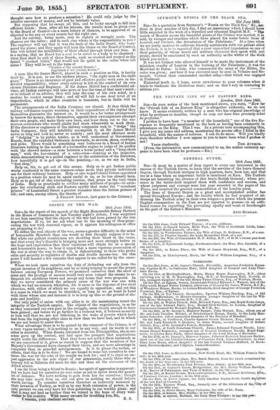OBJECT OF THE WAR.
18th June 1855.
Sin—In the report of the speech of the Right Honourable Sidney Herbert in the House of Commons in last Tuesday night's debate, I was surprised to see him asserting that the objects of the war had been gained by the late negotiations. If so, let me ask what can be the meaning of thus prose- cuting the war with renewed vigour, as it appears his colleagues in office are preparing to do ? To define the real objects of the war, seems a greater difficulty in the mind of honourable Members than one would at first thought suppose it to be. But while our gallant countrymen are shedding their blood in the cause, and that every day's Gazette is bringing more and more strongly before us the hope and expectation that their exertions will obtain for us a speedy and honourable peace, to hear it urged that a more vigorous prosecution of the war is alone the way to obtain it, is disheartening to those who prefer calm and security to registries of deaths and double income-tax. On this point I will hazard a few remarks that appear to me called for by the emer- gency. When we took upon ourselves the duty of :defending our ally from the unjust invasion of its neighbour, and by so doing helping to secure the proper balance among European Powers, we promised ourselves that the show of arms and the prestige of success would very soon compel the enemy to re- linquish his ambitious views and accept any terms that were proposed. In this we never considered the primary cause of the war was one with which we had no concern whatever, for it arose in the disputes of two rival churches, with either of which we are equally in opposition ; and yet this is a cause in which we must be identified, as long as we go hand in hand with those whose aim and interest it is to keep up this as the ground of dis- pute and hostility. Our only point of union with our allies is in the maintaining intact the integrity of the Turkish empire. The objects of the negotiations, in so far as they concerned our own part in the struggle, seem clearly enough to have been gained ; and before we go farther in a ruinous war, it behoves us surely to look well that we are not following in the wake of powers which have had from the beginning other aims in view than we have had, and in which we are not bound to assist them.
What advantage there is to be gained by the conquest of the Crimea, is of a very vague nature; it is nothing to us in any way, and its worth to our allies is doubtful. When Jimmie retreated from the Principalities, she in one sense gave up the contest, and laid open the prospect that negotiations might settle the differences. That they have not settled them insomuch as we are concerned in it, gives us reason to suppose that the members of her Majesty's Government have changed their views, and see more advantage in conquests than in peaceful arrangements. Is it to please the nation, or others, that this is to be done ? We are bound to none but ourselves to con- tinue the war for the sake of the results we look for ; and if to repel an un- just aggression be the sole object of our armaments, surely those who SO bravely fell at Silistria did more for this end than all the successes of the Allied armies.
I am far from being a friend to Russia ; her spirit of aggression is apparent: but we have had for ourselves no real cause as yet to throw down the gaunt- let of defiance. We have nothing to gain from her for ourselves ; though she may take much from us, she can give us nothing we should believe worth having. To consider ourselves therefore as indirectly menaced by their invasion of Turkey, as well as by any fresh extension of power, is the only pretext we can ever have for thus persisting in our warlike plans: and that it may not lead us further than we intend is the hope of every well- wisher to his country. With many excuses for troubling you, Sir,
I remain, your obedient servant, R. S.


































 Previous page
Previous page